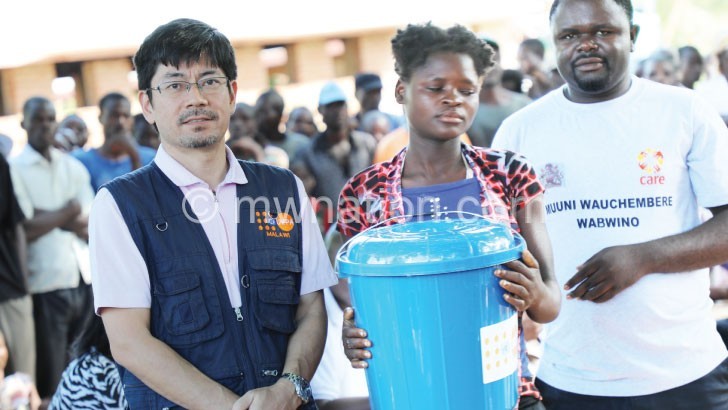Delivering hope in crowded camps
Miriam Demba is expecting her third baby at Mileme Camp in Phalombe. She is among 125 000 Malawians displaced by devastating floods in 14 districts.
“Last month, it rained ceaselessly for two days. On March 8, we heard screams of people escaping rising water in the night. We joined in. By sunrise, Nankhalamba Village was in water and houses were crumbling. I grabbed children and we run for our lives. We crossed a swelling river on a boat,” narrates the mother-of-two.

Demba was eight-month pregnant when flooding Phalombe River forced her to flee her home with her family.
“The wooden boat was overloaded, weighed down by desperate people crossing the water that washed away our homes, crops and livestock,” she says.
But she and her neighbours now occupy a place no less overcrowded than the boat she likens to Noah’s Ark in a biblical tale of devastating floods.
Mileme Primary School houses about 1 500 survivors of the recent floods and torrents that preceded cyclone Idai in southern Malawi, Mozambique and Zimbabwe.
“We sleep in tents where it is impossible to change clothes without looking over my shoulder to ascertain if no one is watching. There is no privacy here. We share the room with young girls. No bathrooms. No mosquito nets. Not even adequate food, breathing space, utensils and safe water. Almost everything is in short supply,” she says.
In the first week there, Demba skipped a day for routine checkups at Chitekesa Health Centre, a six-kilometre trip which costs K1 000 if one takes a motorbike.
“The road was flooded and we were still in shock after losing food, blankets, plates, cups and health passports,” she says.
Demba thanks health workers deployed to treat general ailments and pregnancy-related conditions in all 33 evacuation camps. The team-comprising two nurses-cum-midwives, two clinicians and two laboratory technicians-visits the once or twice a week, says district safe motherhood coordinator Albert Kamanga.
“There are about 33 camps in Phalombe and we have to ensure everyone gets the care they want where they are. We have been here five times because overcrowded places are potential hotspots of several infectious diseases, including malaria, coughs and diarrhoea which are common in these camps,” he says.
Kamanga gave a glimpse of the dilemmas of pregnant women on the cusp of giving birth.
“They sleep in congested rooms without enough space and sanitation. They cannot change their undergarments or pads without anyone in sight. Those about to give birth are worried about birth preparedness kits. What they bought in advance is gone with floods. Now, they have no money to buy new ones. Where do they make money in a camp?” he asks.
And there is not much piecework for Demba’s husband in neighbouring crop fields, she says.
She states: “He leaves in the morning and often returns empty-handed because there is nothing to harvest. All crops went with water.
“My greatest worry is this: “Where will we find a basin, a plastic sheeting, a bucket, a wrapper, pads, soap, candles and other basics when labour begins? We are already struggling to reconstruct our house.”
Every woman needs these things when going to give birth at a health facility.
But Demba worries no longer.
Recently, she was among vulnerable women at the evacuation camp who have received dignity kits from the United Nations Population Fund (UNFPA). There are 149 of them at Mileme.
Those with three months to the probable date of delivery are happy to have the basics handy.
UNFPA has also delivered emergency reproductive health kits to main hospitals in nine districts hit by the disasters that affected almost one million people in 14 districts, with about 731 000 in need of humanitarian assistance. The districts are Nsanje, Phalombe, Chikwawa, Chiradzulu, Blantyre, Zomba, Mulanje, Balaka and Mangochi.
“This is the first time we are receiving SRH supplies for women and children. In the past three weeks, we have received maize and buckets only,” says Mileme camp chairperson Weston Maganga.
The consignment includes condoms and family planning kits to ensure every pregnancy is wanted; props for safe delivery both at a health facility and in camps; and kits for cleaning a woman’s womb after miscarriage or unsafe abortion.
“Displaced women and girls need food, shelter, clean water and sanitation, but even in a crisis like flooding, their sexual and reproductive needs should not be forgotten,” says UNFPA deputy representative Masaki Watabe.
Fannie Kachale, the director of reproductive health in the Ministry of Health, says sexually active girls and women have also been affected in a unique way by devastating disasters in the Southern Region.
“We thank UNFPA for the timely response. Government is promoting universal health coverage. We need to reach out to everyone, leaving no one behind. These women and girls are in camps because they have lost everything. We have to reach out to vulnerable persons with a range of SRH services, including modern family planning methods and dignity kits, to enjoy life,” she says.
With all basics in a bucket, the women about to deliver can afford a smile.
Says Demba: “This is a huge relief. I look forward to deliver safely and to concentrate on reconstruction. I can’t wait to go to the health centre to deliver.”





